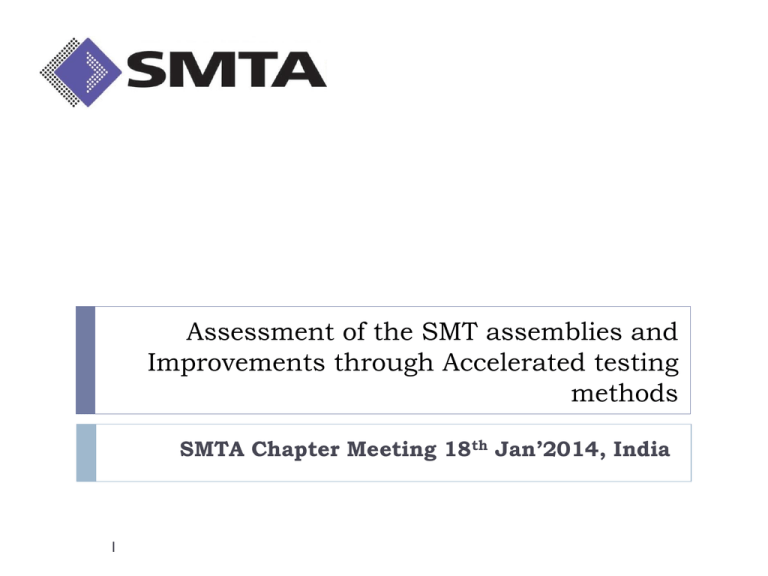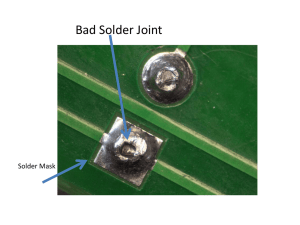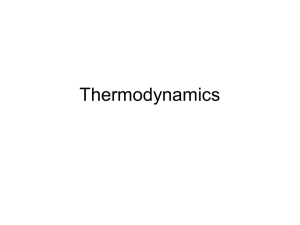Assessment of the SMT assemblies and Improvements through
advertisement

Assessment of the SMT assemblies and Improvements through Accelerated testing methods SMTA Chapter Meeting 18th Jan’2014, India 1 Contents SMT solder defects due Thermo-Mechanical stress- what and how! How much is the affect ? What methods to follow to detect the defects? Acceleration and factors needed for testing Benefits to the industry 2 SMT solder joint defects - what and how…? There are several factors which affect the solder joints. Factors may be environmental , mechanical etc. Direct Load conditions: • Differential thermal Expansion, • Thermal Shock, • Vibration (continuous like during transportation) • Mechanical Shock Factors may act Singly, Simultaneously or sequentially during the end use. Solder joint functions as a high homologous temperature under Thermo Mechanical fatigue condition Challenge for the fields like Military, Aerospace and satellites 3 SMT solder joint defects - what and how…? 4 Vibration, Thermal Shock, Mechanical Shock - Direct possible during use - Resistance against failures induced depends on Solder Joint Strength Differential Thermal Expansion, CTE -Changing temperatures due to Power Dissipation -CTE : Load Fluctuations, ON/OFF Cycles SMT solder joint defects - what and how…? 1. Temperature Cycle Damage 2. Vibration Damage 3. Thermal Shocks -Creep / Stress Relaxation-enhanced fatigue of solder Joints -Vibration causes elastic behavior of joint - Extremely rapid thermal changes (30°C/min+) results in PCBA wrapping -Visco-plastic Strain Causes fatigue damage which accumulate cycle to cycle -Solder joint is loaded by thermal expansion mismatch 5 -Occurrence in Automotive, Military and aerospace applications - Rapid changes in the environmental conditions – sun to shade space - Sudden and large power changes How much is the affect ? Studies indicates that around 48% of Electronics failures are likely due to solder joint failure How much bath tub holds? Surface mount solder joint Reliability is merely governed by ‘infant mortality’ and ‘constant failure rate’ but established by ‘Wear out’ failure region. Electronics Assembly more likely fails due to failure of component in short-term and solder joint failure in Long-term. 6 What methods to follow to detect the defects? 1. Thermal Cycling Test (TCT) Standards: Mil-Std-883 Method 1010 / JEDEC JESD22-A104. Ramp Rate >= 10°C – 14°C/min Soak Time >= 10min (mode 3) Cycling Condition as below: Condition Low Temp High Temp A -55 (+0/-10) ° C 85 (+10,-0) ° C B -55 (+0/-10) ° C 125 (+10,-0) ° C C -65 (+0/-10) ° C 150 (+10,-0) ° C D -65 (+0/-10) ° C 200 (+10,-0) ° C F -65 (+0/-10) ° C 175 (+10,-0) ° C G -40 (+0/-10) ° C 125 (+10,-0) ° C H -55 (+0/-10) ° C 150 (+10,-0) ° C Cycles > 10 to 1000 7 What methods to follow to detect the defects? 2. Thermal shock Test (TST) -In thermal shock, the extremely rapid temperature changes (about 30°C/minute and above) Standards: Mil-Std-883 Method 1011 / JEDEC JESD22-A106 -Results in warping of the surface mount assembly. Ramp Rate <= 20 sec -When the boards are plunged into a new thermal environment. The warpages result in tensile and shear stresses Soak Time > 2 min -Thus, even assemblies with matched Coefficients of thermal expansion will exhibit solder joint Failures when subjected to thermal shock. Cycling Condition as below: Condition Low Temp High Temp A -40 (+0/-30) ° C 85 (+10/-0) ° C B -0 (+2/-10) ° C 100 (+10,-2) ° C C -55 (+0,-10) ° C 125 (+10,-0) ° C D -65 (+0,-10) ° C 150 (+10,-0) ° C Cycles > 15 Example of Board Warpage Due to thermal shock 8 What methods to follow to detect the defects? 2. Vibration Test (Random) Non-Operating Vibration test: Freq: 1-125 Hz, ASD: 2.16 Grms, Shape of ASD Curve: Flat Test Duration: 90 min Axis of Vibration: X, Y and Z (with 30 min each) Standards: IEC 60068-2-64, IEC 60068-2-47 Operating Vibration test: Freq: 5-300 Hz, ASD: 0.5 Grms, Shape of ASD Curve: Flat Test Duration: 90 min Axis of Vibration: X, Y and Z (with 30 min each) Standards: IEC 60068-2-64, IEC 60068-2-47 9 Board Level Drop test Can be conducted along with Vibration Tests What methods to follow to detect the defects? HALT / HASS / HASA:HALT - Highly Accelerated Life Test: Design test used to improve the robustness/reliability of a product through TEST-FAIL-FIX process where applied stresses are beyond the specified operating limits. HASS – Highly Accelerated Stress Screening: Used to improve the robustness/reliability of a product through test-fail-fix process where the applied stresses are beyond the specified operating limits. This is applied to 100% of the manufactured units. HASA - Highly Accelerated Stress Audit: performed via sample testing as opposed to 100% that is done with HASS. Examples of HALT on PCB assembly Example of HALT 10 Accelerated Tests and factors needed for testing - Tests use for demonstrating the solder joint reliability with can be accelerated - Sample size to be decided by Test lab/engineer – preferably 20 + samples - Factors like Temp , Humidity to be selected singly or simultaneously or sequentially - Use the appropriate law /rule for calculating Acceleration factor like Coffin-Manson rule, Arrhenius Equation, inverse power Law etc - Allow product to age than squeezing timelines for cost saving purpose Example of Accelerated Temp/Humidity Test 11 Total test time 47 Days Acceleration (Temp.) 50 C eV/molec ule eV/K °C Activation Energy Boltzman Constant Room Temperature Acceleration Temperature Acceleration Factor 0.7 8.6174E-05 25 50 8.24488727 °C Summary Of the Tests Thermal Cycling Test Thermal Shock Test Mechanical Vibration Test HALT Accelerated Tests 12 Design for Solder Attachment Reliability Design Parameter Value Component size Attachment Type Solder Joint Area Solder Joint Fillet Lead Stiffness CTE mismatch 13 Leaded component better than leadless Benefits to the Industry - Mature product will be attained very early -Production Release will be expedited -Warranty costs will be greatly reduced -Customer satisfaction will be greatly enhanced 14 Questions..? 15 Thank you..!! -Pankaj Bansod bpankaj358@gmail.com 16

